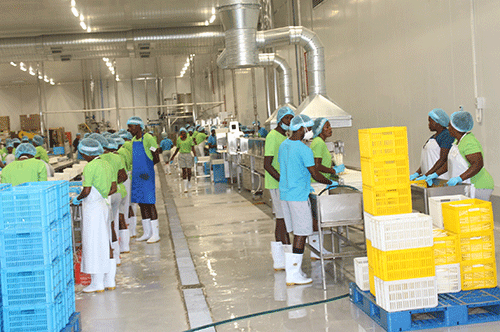Despite a protest last week as a result of misinformation and conspiracy theories among locals, Namibia’s first asparagus processing project is flourishing.
The general manager at the Otjimbele asparagus operation at the Etunda green scheme, Carlos Lertxundi, said he sympathises with residents on the change of weather patterns that caused the delay of the rainy season, but maintained that it has nothing to do with asparagus.
Last week, farm owners and some residents of Etunda and surrounding areas in the Omusati region held a demonstration to call for the closure of the Otjimbele asparagus operation, claiming the farm management installed a device that prevents rain, despite flash floods in the area recently.
Lertxundi stressed that there is no such device, and the residents later verified that the device which was seen in the area was an automatic weather station that has nothing to do with the prevention of rainfall.
“The protesters shared their concerns. We explained that this is not true, and we have no such device. We went to the field to inspect the suspected device, and they saw and understood that it is just a normal weather station. On that basis, the petition was later withdrawn,” he explained.
The weather station there is being used for real-time information on weather at the farm level, and also provides information on soil moisture and temperature to give better information on irrigation requirements.
“I fully understand their concerns on the change of weather patterns, and subsequently the delay of the rainy season, as opposed to how it was traditionally. But asparagus has nothing to do with this. Even before we started, there were periods of terrible drought,” he said.
The planting of the asparagus started in July 2017 at Etunda, after which the trial harvest took place in December 2018.
Lertxundi said the project had just kicked off, and is now heading into what is called the productive years of asparagus (it takes two years to start giving a commercial yield).
According to the general manager, they exported 13 containers of asparagus to main export country Spain last year.
“We could not sell locally because we need to register for the labelling with the required Namibian entities, like the Namibia Standards Institution (NSI). We were certified in hazard analysis and critical control points (HACCP) last August by the trade ministry and others. We are working towards getting all the green lights from the said institutions within this year, and that our asparagus starts being seen on Namibian shelves around the third quarter of August 2022,” he noted.
The project is employing 800 people. “At the end of the day, we are creating a lot of employment and thus allowing many families to have access to food security and a better living standard. We aim to improve and uplift the standards of living of our surrounding communities in this way,” he added.
Asparagus is a very healthy vegetable, which is diuretic and therefore helps to clean the body. It has a high content of fibre, which is good for any type of diet.
Asparagus needs to be cooked, mostly in salted boiling water, and is eaten with salt and pepper, oil, butter or plain.
– ljason@nepc.com.na


